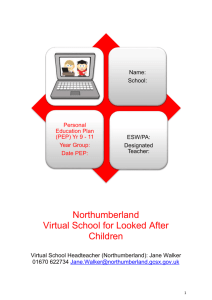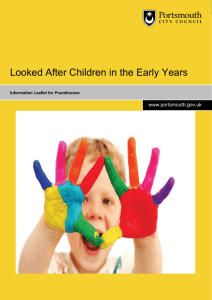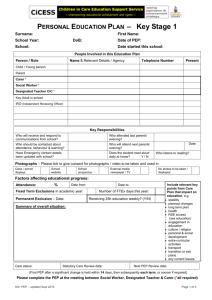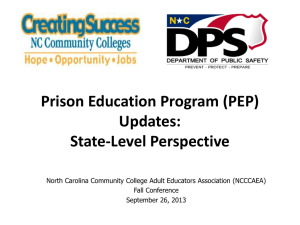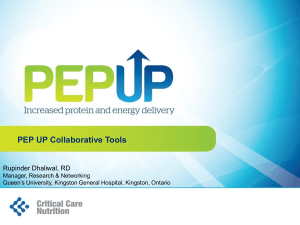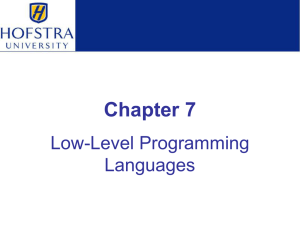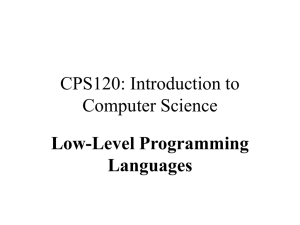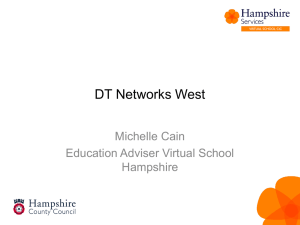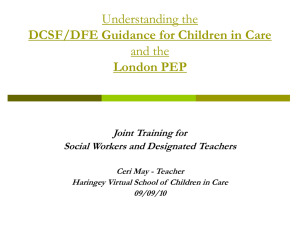1 Power Point PEP and PP training May 2014
advertisement
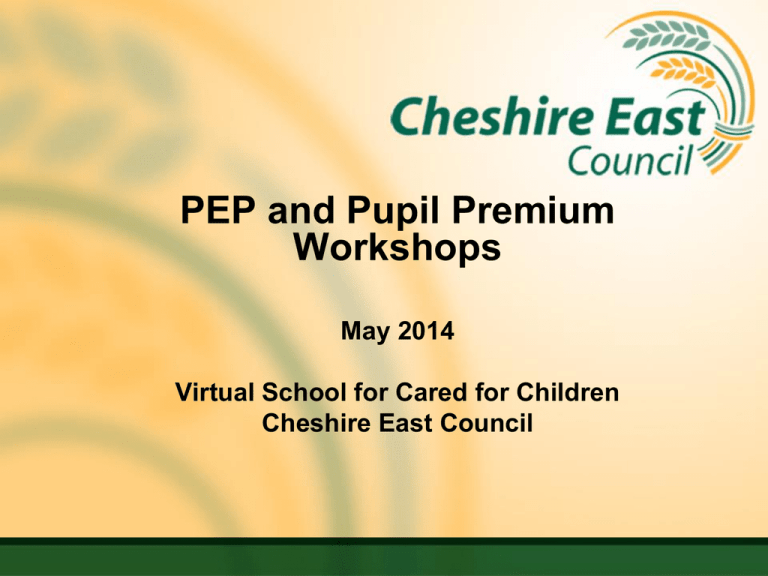
PEP and Pupil Premium Workshops May 2014 Virtual School for Cared for Children Cheshire East Council Agenda Welcomes and Introductions Aim and objectives Local Authority perspective and priorities PEP process – duties of schools and others Data collection systems Action planning Break Sharing of school practice Quality Assurance Next steps and agreed actions Aim and Objectives Aim To ensure that the PEP process operate in a consistent and high quality manner and leads to excellent support and improved achievement for cared for children. Objectives Shared understanding of the responsibilities and operational issues regarding PEPs Know how use of Pupil Premium should be reflected in the PEP Recognise how PEP quality can be assessed and improved Role of the Designated Teacher ‘Duty to promote the Educational Achievement of looked after children’ Achieved by Removing barriers to admission Monitoring progress – academic and social Reviewing attendance and exclusions Ensuring additional (SEN or GAT) are met Check that school policies do not hinder Review impact of teaching and learning policies Utilise Pupil Premium to support achievement Making the PEP a clear record and plan for each child PEP overview Basic information should be provided by SW/VS May be written by DT with other staff Provide history of education, support and impact Identify educational needs and use of PP Include short/long term actions and milestone Facilitate the views of the child Include rigorous monitoring procedure Identify accountability for making plans happen The PEP is a ‘living’ document. It provides continuous record of the child’s educational progress and aspirations and reflects the individual planning on how to support them. Key changes and impact Responsibility of VS to monitor and track progress, supporting and challenging schools to find new ways to meet each child’s needs VS now assess each case and identify the support needs of the child Support will be targeted and available for those in greatest needs Greater focus on action planning and monitoring PEPs to be held each term from Sept VS may not attend every PEP meeting but will provide information and support where needed and is available throughout. Data collection systems What is data?? “Data beats emotions” “Errors using inadequate data are much less than those using no data at all.” “It is a capital mistake to theorize before one has data. Insensibly one begins to twist facts to suit theories, instead of theories to suit facts.” “What gets measured (and clearly defined) does get done.” Why do we need to collect the data? 90,000 cared for children nationally and growing 350+ cared for children in Cheshire East Close the gap – “the educational achievement of looked after children as a whole remains unacceptably low” Up to 50% of Cheshire East children receive their education in provision/schools outside the boundaries of Cheshire East Like any good parent the Local Authority needs to know exactly how our children are progressing/what their educational targets are/how we can help them Cheshire East Local authorities are parents to these children. Virtual schools are at their most effective where corporate parenting is strong and challenges and supports the virtual school effectively. In Cheshire East - Children’s Services are committed to improving the educational achievement of all cared for children. Nationally - England OFSTED and the Government/Department for Education – all authorities have to report on educational performance of their cared for children. Outcomes for children looked after by local authorities in England https://www.gov.uk/government/publications/out comes-for-children-looked-after-by-localauthorities-in-england-31-march-2012 So what do we collect? Early Years – information on the EY PEPs KS1 – KS3 – information on KS1/KS2/KS3 PEPs Section B - Welfare Call termly collection on Reading Writing and Maths plus questions about whether the pupil is making nationally expected progress in English and Maths - record on spreadsheet to report to Corporate Parenting - report KS2 results to DfE So what do we collect? KS4 – information on KS4 PEP Section B - termly collection on GCSE/KS4 courses and subjects plus questions about whether the student is making nationally expected progress in English and Maths - record on spreadsheet to report to Corporate Parenting - report to DfE KS4 results – entered for GCSE/number of A* - G/number of A* - C/ number of A* - C including English and Maths What do we need from providers/schools? Accurate assessments of child’s levels/progress/development Requests for information returned as promptly as possible Termly returns (Data Return) plus information recorded on PEP updates 3 times per year. The termly returns (Data Return) will be the VS data sweep. Precise target setting Interventions to assist improvement/progress/development The role of the Designated Teacher? – information and data Liaise closely with Data Manager at school Liaise closely with the Heads of Department/subject staff/class teachers of the Cared for Children on roll Challenge staff/question staff about how the student can be helped to improve/what interventions are needed/details about areas for development or improvement The role of the Designated Teacher? - PEPs An effective PEP can be used to asses the impact of the teaching and learning and progress towards targets Provide detailed information for the PEP – attendance/subject staff comments/FFT B/current levels or grades/target levels or grades/most likely levels or grades/level of entry Ensure a log of interventions is kept Ensure barriers and actions are recorded on the PEP Section A and review the actions at next PEP The role of the Designated Teacher? - the student/child Support the pupil/student to understand targets/interventions/expectations Ensure the pupil/student feels secure with his/her learning Ensure targets, aspirations and expectations are appropriate to the individual student’s abilities Stress to the pupil/student the importance of progress rather than raw grades The role of the Designated Teacher? - you are so important You are the vital link between subject staff/class teachers Never underestimate how important you are Contact the Virtual School if ever you think we may be able to help Thank you for ALL you do. The most valuable commodity I know of is information Gordon Gekko, Wall Street (1987 Promoting the Educational Achievement of Looked after Children and Outcome Indicators https://www.gov.uk/government/uploads/system/upl oads/attachment_data/file/276468/educational_achie vement_of_looked_after_children.pdf https://www.gov.uk/government/publications/outcom es-for-children-looked-after-by-local-authorities-inengland-31-march-2012 Quality Assurance To Quality Assure the PEPs we asked the following four questions: “To what extent is the PEP filled in completely and with sufficient detail to allow a conclusion about the child’s experience to be drawn?” “How appropriate are the actions to support the progress of each child and are they sufficiently detailed so that the impact can be monitored?” “Based on the information provided, is the school responding appropriately to meet the needs of the child?” “Using the information provided and your professional judgement how you would RAG rate the educational experience of the child and therefore the level of support needed?” Quality Assurance Activity : In pairs Quality Assure two PEPs from your Key Stage. Feedback comments.
